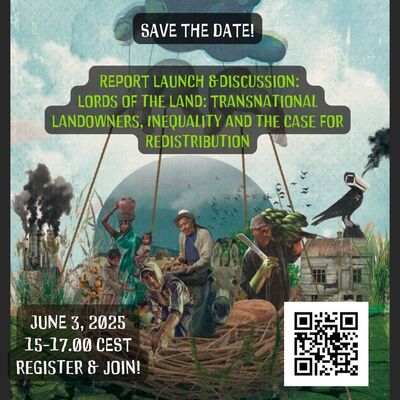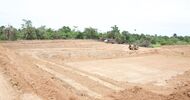Major asset managers, cowed by the cost, the risk and the controversy involved in investing in farmland, are joining forces to increase investment in the historically under-capitalised sector.
Africa’s agriculture and food industries are attracting increasing interest from investors. This trend is largely fuelled by the fact that the continent has 60% of the world’s uncultivated arable land, with favourable weather conditions in many countries.
- HowWeMadeItInAfrica
-
27 February 2013
US-based Aslan Global Management, a leader in the "patient capital" movement, manages more than 12,000 hectares of farmland in Ukraine and Mozambique on long-term lease and just entered into a 99-year lease for 45,000 hectares in Tanzania.
- World Magazine
-
22 February 2013
The potential for bottom-line financial damage from insecure land tenure risk range from massively increased operating costs – as much as 29 times over a normal baseline scenario, according to our modeling – to outright abandonment of an up-and-running operation.
Agriculture has scarred some big hitters in the investment world. Many are now wary of a sector that is at the mercy of fickle weather, political risk and quixotic governments.
- Offshore Corporate
-
27 January 2013
Investors snap up California acreage, pushing prices to record highs, as global appetites for almonds and pistachios increase.
- LA Times
-
26 December 2012
The fund house aims to capitalise on Japanese pension plans' growing interest in new investment types, including Asian fixed income and certain alternatives like farmland
- Asian Investor
-
20 December 2012
This piece is part of "Water Grabbers: A Global Rush on Freshwater", a special National Geographic News series on how grabbing land—and water—from poor people, desperate governments, and future generations threatens global food security, environmental sustainability, and local cultures.
- National Geographic
-
14 December 2012
Ander Einarsson, a partner at Phatisa and the team leader responsible for the Feronia deal, answered a few of How we made it in Africa’s questions.
- HowWeMadeItInAfrica
-
13 December 2012
Many of the world’s biggest pension funds as well as family offices of wealthy individuals –looking for diversification and steady returns in times of market volatility– have been pouring money into farmlands, writes Kelvins Tan
- The Edge Malaysia
-
06 December 2012
Agricultural land represents an $8.4 trillion market, of which institutional investors own about $30 billion to $40 billion, according to Macquarie Agricultural Funds Management.
- Bloomberg
-
05 December 2012
For all the willing buyers seeking tracts of Australian farm land, local investors are not among them. They wonder what all the fuss is about.
Africa is regarded as the New Eldorado, and is attracting many foreign based private or public investment companies, sovereign wealth funds and even pension funds gradually. Sadly, while foreigners continue to play a major role in growth investments, African pension funds' contributions to this growth are dismal.
- Huffington Post
-
17 November 2012
“Every day I field calls from potential investors, from pension funds, from family businesses that want to buy” from inside and outside Canada, said Doug Emsley, president of Assiniboia Capital Corp.
- Bloomberg
-
08 November 2012
Indian companies which invested in controversial deals involving hundreds of thousands of acres of land in Ethiopia have found themselves out of their depth in a fast-growing African economy.
- The Hindu
-
26 October 2012
Only legal recognition of commons as the communal property of communities is sufficient to afford real protection, writes Liz Alden Wily
- Wealth of the Commons
-
23 October 2012
A slide show by GRAIN that profiles some of those who have been most actively pursuing or supporting farmland grabs around the world.
MetLife Inc, the largest US life insurer, started a business to make agricultural loans in Brazil as insurers expand in developing markets and seek investments to boost income with interest rates near record lows.
- Bloomberg
-
16 October 2012
Logging companies in PNG are using special agricultural leases to clear vast tracts of rainforest timber, on the promise of roads and economic development for remote villages. Jemima Garrett investigates.
African agriculture has a big investment problem: lots of private equity interest but few opportunities because most farms and companies are too small to absorb the cash or provide attractive returns.
- Reuters
-
29 September 2012
February 2012 workshop in Ouidah, Benin brought together over thirty participants from farmer organisations and NGOs in West and Central Africa to share experiences and analysis of land grabs.
Since Jane Mendillo took over the endowment in July 2008, Harvard’s holdings of forests, farms and other natural resources in Brazil as well as in New Zealand and Romania have grown to about 10 percent of the portfolio -- more than $3 billion -- and she wants to add more.
- Bloomberg
-
18 September 2012
The private sector needs to double investment in the land itself to help drive agricultural development in countries that need it most, say the heads of EBRD and FAO
From the World Bank to pension funds, efforts are under way to regulate land grabs through the creation of codes and standards. Rather than help financial and corporate elites to "responsibly invest" in farmland, we need them to stop and divest.
Jeremy Grantham of US asset management firm, Grantham, Mayo, Van Otterloo and Company (GMO), says global investors should have 30% of their portfolios exposed to natural resources, with half of that in forestry and farmland, to take advantage of the growing global food crisis. That is double today's averages.
- Top 1000 Funds
-
03 August 2012
Everyone seems to agree on the need for “investment” in agriculture to fight hunger and support rural development, but the focus is exclusively on investment funds and big business, and nothing about farmers. Is the term part of a disinformation campaign to serve the interests of only a few?
Investors are honing the focus of their cash on real assets including farmland, timber, mines and energy projects, which are less correlated to financial markets.
With communal land associations communities will be having one voice and if anybody, be it government or investor, is interested in their land, that person is made aware of that the group is organized and therefore not easy to simply deploy graders to start tiling or clearing the land.
Passive indices have been replaced by new sophisticated active indices and pension fund managers like APG are investing in natural resources assets, including farmland.
Does the Hantz megafarm project in Detroit (US) have anything in common with the brutal, large-scale land acquisitions sweeping Sub-Saharan Africa and Latin America?
















